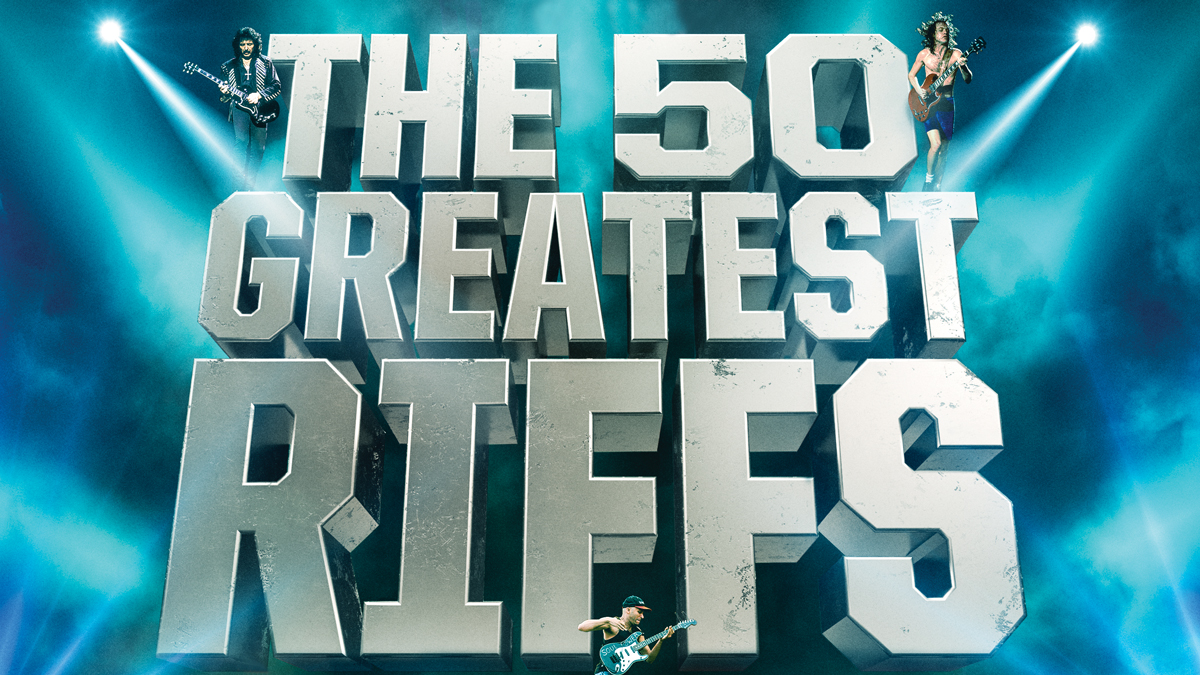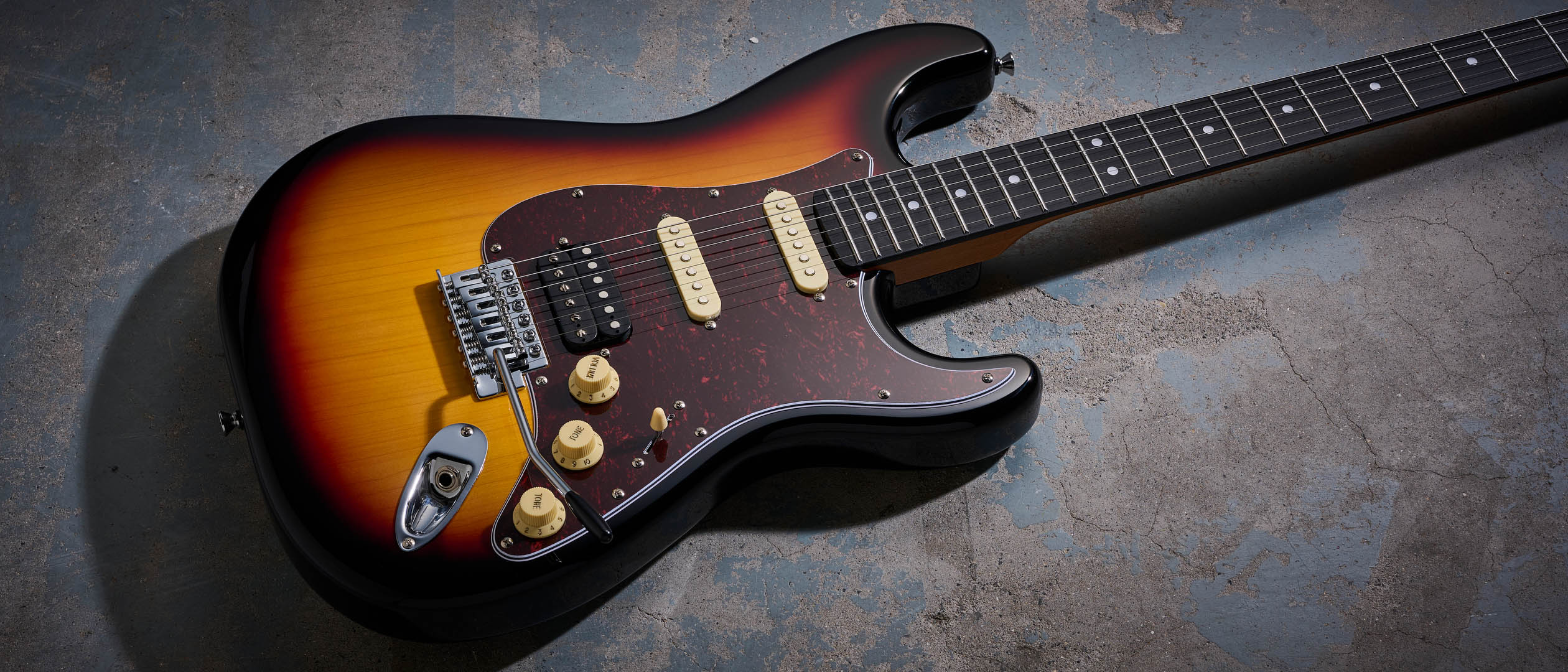The 50 greatest guitar riffs of all time
From metal to rock, punk to grunge, these are the best guitar riffs ever recorded, as voted for by you

Which is truly the greatest riff of all? Total Guitar is tackling this thorny subject and aiming to end the debate once and for all. To do so, we asked readers of Guitar World for their help as we posted a poll to gauge their collective opinions. To begin with, we prepared a shortlist of our own favourite riffs – well, short-ish!
Even following a strict self-imposed ‘one riff per artist’ rule we were only able to pare our selection down to 125 riffs. That meant no Paranoid, nor even Highway to Hell. One riff per band. That was the rule. And, though it was possible to offer up alternative suggestions, by and large, it seems the good readers of Guitar World agreed with our selection.
So, read on as we run you through 50 of the finest riffs ever recorded. We’ll tell you the stories and hear from some of the guitarists who played on the recordings.
Let's get started…
50. Heir Apparent – Opeth (2008)
Prog metal majesty courtesy of Stockholm’s finest
We begin our riff rundown with this cut from the Swedish group's death-metal years. There's an abundance of mind-boggling riffs on offer, though it's the one that arrives two and a half minutes in that arguably presents Mikael Åkerfeldt’s genius at its most sonically destructive.
Kicking off with powerchords from the 1st fret to open position, it then alternates between quick-fire descending octave shapes higher up the neck and palm-muted chromatic notes down below – warring with each other in the most spectacular of ways. The solo, played by Fredrik Åkesson, then adds to the chaos, using a dramatic mix of bluesy bends and diminished runs to capitalise on its outside feel.
Get The Pick Newsletter
All the latest guitar news, interviews, lessons, reviews, deals and more, direct to your inbox!
49. Ticket to Ride – The Beatles (1965)
Rickenbacker chime and Indian influence
Released as a single in April 1965, Ticket To Ride became the Beatles’ seventh consecutive UK number one, and its instantly recognisable opening motif is played with two fingers on a 12-string. The chiming arpeggiated riff is underpinned by repeating A chords and, with the low A drone over the top, hints to the traditional Indian music that would become increasingly influential on the band.
Played by Harrison on his Rickenbacker 360/12, the motif has an ethereal, slightly tinny sonic quality. Staggered phrasing – which employs a quarter-note triplet at the end – adds to that free-and-easy '60s vibe.
48. All Right Now – Free (1970)
Paul Kossoff in complete control
Consider us somewhat surprised that Free’s 1970 mega-hit only just crept into the Top 50! The opening few seconds – with Paul Kossoff ’s cranked-up Les Paul keeping a steady pace with Simon Kirke’s thumping beat – is one of the most recognisable intros of all time. Kossoff was playing one of his several Les Paul sunbursts on All Right Now, plugged into a Marshall stack.
As singer Paul Rodgers said: “Koss had such an amazing sound on that opening chord and with his chord structure on the A chord. He had such a long reach and could actually hold the A note on the E string on the 5th fret. He could get a real ripping sound and it had a lot of depth to it.”
47. G.O.A.T. – Polyphia (2018)
The dazzling sounds and techniques that redefined modern guitar
In recent years, Polyphia guitarists Tim Henson and Scott LePage have established themselves as leaders of the new pack – blending elements of fusion, tech-metal and trap beats into their own mind-melting cocktail of noise.
2018 track G.O.A.T. is one of their most popular to date, racking up 50 million plays on YouTube and Spotify combined – its main motif built on a bed of harmonics, 19th and 20th fret taps, bleeding open strings and B natural minor arpeggios.
Both players used Ibanez guitars for the recordings, while tone-wise Henson plugged into “only the Fractal and a little bit of BIAS FX” while LePage opted for a more traditional Orange amp and cab.
46. Soundgarden – Outshined (1991)
Grunge power in 7/4 time
In 1991, the year that Seattle rock ate the world, Badmotorfinger was Soundgarden’s breakthrough album, and Outshined was its most accessible song. The groove of the opener and verse drop D riff is the stuff of stoner rockers’ dreams, with single-finger bends from guitarists Kim Thayil and Chris Cornell complementing its hook superbly. Quite simply, it’s the definition of badass.
But true to the band’s left-field tendencies, it’s in a 7/4 meter. And in grunge’s most experimental and inventive band, Thayil’s role was pivotal, melding Stooges-style aggression and psychedelic Sabbath slab through his ’70s Guild SG-100.
45. No One Knows – Queens of the Stone Age (2002)
Stoner rock’s finest hour
QOTSA’s breakout hit has a riff so strong it serves as the de facto chorus. Sure, the “I realise you’re mine” part repeats, but watch the crowd at any gig to see that the guitar riff is what everyone’s waiting for.
Josh Homme took a hipster approach to gear, refusing to touch Marshalls, Voxes, Fenders or Gibsons for the making of Songs Of The Deaf. No One Knows used three amps together: a solid-state Peavey, an Ampeg VT40, and an old Tube Works head. The unique recorded tone was a careful blend of microphones from this idiosyncratic rig.
44. Can't Stop – Red Hot Chili Peppers (2002)
A funky masterclass in fret-hand muting
Rock guitarists don’t get much funkier than the Chili Peppers’ John Frusciante, and the third single from 2002’s By The Way featured the smash album’s most rhythm-heavy riff. A player of vintage Strats and Teles, Frusciante employs a sharp, ballsy single-coil bridge-pickup tone.
The verse’s repeated two-note figure, D to E (G string, 5th and 7th fret) represent the flat 7th and root of the E minor key. Frusciante hits the root notes of the chords (Em, D, Bm, C), and keeps it clean with his deceptively complex fret-hand string muting technique. Add in his aggressive and funky right hand, and you’ve got all the makings of an unstoppable riff...
43. Life in the Fast Lane – Eagles
Country-rockers dive headlong into hard rock
Another monster that started life as a warm-up, Life In The Fast Lane was just an exercise for Joe Walsh until it caught his bandmates’ ears. The riff works by the sorcery of rhythmic displacement. It’s essentially the same idea played three times with slight variations, but the fourth repeat begins half a beat earlier, creating massive urgency.
The Eagles’ Hotel California-era tones were Fender-driven, and this track carries the raunch of Fender Tweed Deluxes and Champs driven hard. Walsh played a Strat, while Don Felder played his ’59 Les Paul – the ultimate tag team of guitarists and instruments.
42. Message in a Bottle – The Police (1979)
Their first number one, and to many, the best of The Police
Powered by Summers’ signature hooky riff, Message In A Bottle distilled the trio’s blend of post-punk and white reggae into what he called “a very different-sounding pop song”. And while there was always tension between them, Summers knew that this band was the perfect vehicle for his playing.
“It was a unique chemistry,” he said, “between the guitar, the bassline, the high vocals that Sting had then, and Stewart (Copeland)’s unique drumming. Never to be repeated.“
41. Stargazer – Rainbow (1976)
Ritchie Blackmore at his most unstoppable
In this epic track from Rainbow’s classic second album, Rising, there’s a walking feel to the main riff thanks to the inclusion of passing tones within its pentatonic framework, with a three-note chromatic run starting on the fifth fret of the fifth string from the minor 7th to the major 7th and then finally the E octave.
Around this period guitarist Ritchie Blackmore was mainly using an Olympic White ’73 Strat and a sunburst ’74, both with scalloped necks, going through a Marshall Major modded for more power and distortion.
“This extra output stage basically made the 200-watt into a 280-watt,” he once revealed. “So I did have the loudest amp in the world.”
Amit has been writing for titles like Total Guitar, MusicRadar and Guitar World for over a decade and counts Richie Kotzen, Guthrie Govan and Jeff Beck among his primary influences as a guitar player. He's worked for magazines like Kerrang!, Metal Hammer, Classic Rock, Prog, Record Collector, Planet Rock, Rhythm and Bass Player, as well as newspapers like Metro and The Independent, interviewing everyone from Ozzy Osbourne and Lemmy to Slash and Jimmy Page, and once even traded solos with a member of Slayer on a track released internationally. As a session guitarist, he's played alongside members of Judas Priest and Uriah Heep in London ensemble Metalworks, as well as handled lead guitars for legends like Glen Matlock (Sex Pistols, The Faces) and Stu Hamm (Steve Vai, Joe Satriani, G3).






![Red Hot Chili Peppers - Can't Stop [Official Music Video] - YouTube](https://img.youtube.com/vi/8DyziWtkfBw/maxresdefault.jpg)





![John Mayer and Bob Weir [left] of Dead & Company photographed against a grey background. Mayer wears a blue overshirt and has his signature Silver Sky on his shoulder. Weir wears grey and a bolo tie.](https://cdn.mos.cms.futurecdn.net/C6niSAybzVCHoYcpJ8ZZgE.jpg)

![A black-and-white action shot of Sergeant Thunderhoof perform live: [from left] Mark Sayer, Dan Flitcroft, Jim Camp and Josh Gallop](https://cdn.mos.cms.futurecdn.net/am3UhJbsxAE239XRRZ8zC8.jpg)






